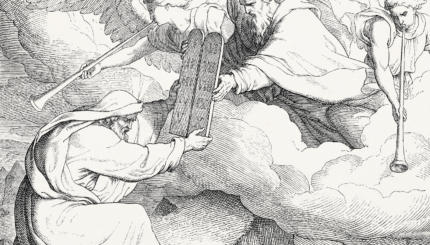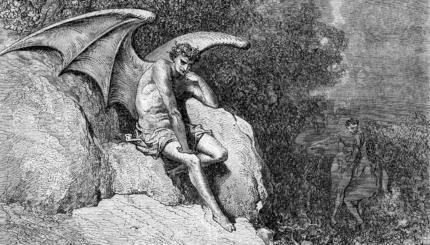Jewish texts and lore are replete with miracles and wonders, from the shofar blast that brought down the walls of Jericho (Joshua 6:20) to the bush that burned with fire but was not consumed (Exodus 3:14) to what is perhaps the most iconic miracle of all time: the splitting of the Red Sea (Exodus 14:21).
Likewise, many Jewish holidays commemorate miracles that were performed on behalf of the entire people. Passover celebrates the miraculous rescue of the Jews from slavery in Egypt. Hanukkah commemorates the rededication of the Temple in Jerusalem and the tiny cruse of oil that burned for eight straight days. Purim recalls an improbable Jewish escape from genocide. The latter two holidays have, as their signature prayer, Al Hanisim — “For the Miracles.”
In common English parlance and as a matter of general intuition, we think of a miracle as an event that violates the laws of nature. However, this idea would not have made sense for Jews in antiquity who did not conceive of God, the creator, as outside nature. The Bible’s word for miracle, nes, means something like “banner” or “sign” — a miracle was something God wrought in order to make a statement, to change the course of human affairs.
The Hebrew Bible: God Acts Directly In the World — A Lot
In the Hebrew Bible, God isn’t a detached creator of the world, but a powerful force whose presence is felt throughout the generations. God cares deeply about human affairs and sometimes interferes with dramatic flair. Whether it’s Balaam’s donkey opening her mouth to speak (Numbers 22:28) or Aaron’s staff turning into a serpent (Exodus 7:8) or a pillar of fire leading the Israelites through the wilderness (Exodus 13:21) these spectacular phenomena are designed to shift human understanding and behavior.

Help us keep Jewish knowledge accessible to millions of people around the world.
Your donation to My Jewish Learning fuels endless journeys of Jewish discovery. With your help, My Jewish Learning can continue to provide nonstop opportunities for learning, connection and growth.
Sometimes, miracles are life sustaining — like the manna that falls from heaven (Exodus 16:13) or water that springs from a rock (Numbers 20:8) or the jar of oil that contains many times its own volume (2 Kings 4:4). Sometimes, they are a terrifying punishment — like the flood that wipes out an evil generation (Genesis 7:17) or the plague that kills the firstborns of Egypt (Exodus 12:29) or the fire that consumes Aaron’s sons (Leviticus 9:24) or the pit that opens up to swallow the mutinous Korah and his followers (Numbers 16:31).
God sometimes performs miracles directly, like delivering Daniel from the lion’s den (Daniel 6:16) or sending a fish to swallow Jonah and then spit him back out again (Jonah 2:1), but often human beings perform them with God’s assistance: Moses parts the Red Sea (Exodus 14:21), Joshua makes the sun and moon stand still in the sky (Joshua 10:12), Elijah rains down fire from heaven (1 Kings 18:30) and brings a child back from the dead (1 Kings 17:22) — as does his protege, Elisha (2 Kings 4:32). In the Bible, miracles are an important way that God works in the world, steering humanity and offering proof of God’s ongoing might and care.
Talmud: Rabbis Calling on God
The Talmud is also replete with miracles. In the Hebrew Bible, it is often prophets who can call on divine power to perform miracles. The rabbis believed the age of prophecy had ended, but many rabbinic sages were still believed to wield this power — their learning and piety invested them with the merit to call on God. Thus, Honi stands in a circle and demands that God bring rain to end a drought (Taanit 23a) and Rabbi Meir (who is also known by the sobriquet “Master of the Miracle”) saves a man from almost certain execution by teaching him the right way to call on God (Avodah Zarah 18a).
The rabbis also understood that there were limits to what God will do, even for the most righteous. Mishnah Berakhot 9:3, for example, explains that a “vain prayer” is one that asks God to undo something that is already done. When a woman is pregnant, one should not pray for the child to be a boy, since the child’s sex has already been determined. If one sees a house on fire in the distance, one should not pray that it is someone else’s home for the same reason.
On Shabbat 53b, we find a story of a man whose wife dies suddenly after giving birth. Arms full of a squalling, hungry infant and too poor to afford a wet nurse, the man prays and God endows him with breasts full of milk. One rabbi comments that the man must have been especially worthy to have merited such a miracle. Another demurs: “On the contrary! How unworthy this man must have been that the order of creation was changed on his behalf.” This has been read as a critique of the man who prayed for a private miracle — the idea being that miracles should be reserved for communal problems. It could also be a crack about the strain of lactation and the discomfort a man might feel when unexpectedly burdened with breasts.
The classical rabbinic period also saw the rise of an important staple of Jewish folklore: stories about the wondrous deeds of the prophet Elijah. The Hebrew Bible implies that Elijah never died, but rather when his time on earth came to an end he ascended to heaven in a fiery chariot (2 Kings 2:11) where he is reputed to wait until he can come back to announce the imminent coming of the Messiah. There are many Elijah tropes in Jewish lore, but one holds that he wanders the earth in disguise, helping those in distress through miraculous means.
Medieval Period: More Rationalistic Challenges
By the medieval period, Judaism was increasingly challenged by both philosophy and Christianity, and one finds more rabbinic attempts to explain the miracles described in the Bible and Talmud as plausible natural events — or, in any case, not supernatural. Maimonides, one of the greatest Jewish thinkers of all time, steeped in Aristotelian thought, argued along these lines:
“We believe that the Divine Will ordained everything at creation and that all things, at all times, are regulated by the laws of nature and run their natural course in accordance with what Solomon said, ‘As it was so, it will ever be, as it was made so it continues, and there is nothing new under the sun.’ (Ecclesiastes 1:9) This occasioned the sages to say that all miracles which deviate from the natural course of events, whether they have already occurred or, according to promise, are to take place in the future, were foreordained by the Divine Will during the six days of creation, nature being then so constituted that those miracles which were to happen really did afterward take place. Then, when such an occurrence happens at its proper time, it may have been regarded as an absolute innovation, whereas in reality it was not.” (Eight Chapters, 8:9–10)
This paragraph is likely intentionally difficult to read. Maimonides always disguised his most dangerous and provocative ideas so that only the most learned would be able to decipher them. Here, Maimonides claims that all things which seem miraculous are actually part of the planned natural order of the universe — not outside the laws of nature, but preordained. His proof of this is a rabbinic notion that certain miraculous things were created at the proverbial eleventh hour, squeezed in at twilight on the sixth day of creation, just as God was completing the world, as we read in Pirke Avot 5:6:
“Ten things were created on the eve of the Sabbath at twilight, and these are they: [1] the mouth of the earth, [2] the mouth of the well, [3] the mouth of the donkey, [4] the rainbow, [5] the manna, [6] the staff [of Moses], [7] the shamir, [8] the letters, [9] the writing, [10] and the tablets. And some say: also the demons, the grave of Moses, and the ram of Abraham, our father. And some say: and also tongs, made with tongs.”
Most of these are references to miraculous events or objects known from the Bible — the donkey that opened its mouth and reproved Balaam, the rainbow that was God’s sign to humanity that no flood would again destroy the entire world (remember, the Hebrew word for miracle means “sign”), the worm that ate through stone enabling Solomon to construct the First Temple using no instruments of war, and so forth. Maimonides’ understanding of this text seems to be that miracles are not in endless supply but, rather, God planned for a limited number and created the items necessary for their completion at twilight on the sixth day of creation.
Early Modern Period: Personal Miracle Workers and the Rise of Hasidut
While biblical prophets were driven to wonder-working by a divine call and historically extraordinary rabbis were known to have worked wonders now and again, in the early modern period wonder-working became a bona fide profession. From Europe to North Africa, there were rabbis (and Jews without ordination) who offered miraculous services: treating disease, solving business crises, conjuring suitable marriage partners, curing infertility.
This was perhaps nowhere more pronounced than in Hasidut which centered the wonder worker. This 18th century spiritual revivalist movement began with a man called the Baal Shem Tov. A baal shem means one who is a “master of the name” — one who can invoke the name of God to perform wonders. There were many such people in those days, but the Baal Shem Tov, as his title implies, was a particularly good one (tov means “good”). The Baal Shem Tov was different from other baalei shem (plural) in that he sought to render miracles not just for individuals who would pay to have their problems solved, but on behalf of all Israel. His reputed powers were extraordinary from raising people from the dead to cloaking himself in invisibility to walking on water. He intiated one of the greatest revolutions in Jewish history.
Generations of ic rebbes were reputed to have performed miraculous feats. One of the most famous, Rebbe Nachman of Breslov, succinctly expressed the centrality of miracles to the world view:
“There are people who obscure all miracles by explaining them in terms of the laws of nature. When these heretics who do not believe in miracles disappear and faith increases in the world, then the Messiah will come. For the essence of the redemption primarily depends on this — that is, on faith.” (Likutei Moharan)
And yet, there is another Hasidic saying that a Hasid who believes every miracle story he hears is a fool, though one who believes they couldn’t happen is an unbeliever.
Modern Period: No Single Answer
What has been presented here is far from comprehensive. In every age of Jewish history, there have been numerous beliefs about miracles — a complexity and texture that is elided in a short summary article like this one. Not all biblical authors described miracles (for example, though Purim celebrates a seemingly miraculous rescue from genocide, the Book of Esther presents the account with no explicit reference to divine assistance), and not all rationalistic thinkers of later periods rejected them. Today as well, there is no single way a Jew is required to think about miracles. There are those whose faith rests on secure belief that God performed these wonders as they are described — and that more are possible. Equally, some Jews believe that God is actively engaged in the world through what might be called Divine Providence (hashgachah pratit in Hebrew) and who call on the help of heaven (siyata dishmaya). Others understand miracle accounts as fantastic stories or allegories that enhance their spirituality in other ways. Still others have sought rational explanations for the miracles recorded in Scripture. This mixture of approaches is nothing new — like so much else in Judaism, the tradition holds room for more than one view.



